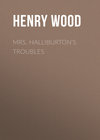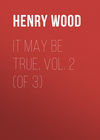Czytaj książkę: «The Channings», strona 28
CHAPTER XLII. – AN OFFICIAL CEREMONY INTERRUPTED
A grey dusky morning, enveloped in fog, succeeded to the fine night. Before seven o’clock—so watchful and alert are boys when mischief is afloat—most of those who had been in the conspiracy were assembled, and waiting round the schoolroom doors. Generally, they could tear up at the twelfth moment. They would not have missed the sight of Charles Channing’s arrival for half-a-crown apiece, so curious were they to see how he looked, after his fright. As it happened, it was not at any of their homes that inquiries had been made the previous night; not one of them was, to say, intimate with Charley: they were most of them older than he. Consequently, they knew nothing of the search. Tod Yorke, who did know of it, had not yet arrived. Of all the king’s scholars, none were marked late more frequently than Master Tod.
The senior boy had gone to the head-master’s for the keys as usual, and now came down the cloisters, clanking them in his hand.
“Has Charles Channing turned up?” he called out, before he was well abreast of them.
Pierce senior choked away his inclination to laughter, which the sound of the name excited, and saucy Bywater answered. “Where should he turn up from, Huntley? Has he been swallowed?”
“Hamish Channing came to our house last night, ages after I was in bed, saying they couldn’t find him,” replied Huntley. “What was in the wind last night with old Calcraft?”
The boys looked at him demurely; and Huntley, receiving no reply, unlocked the schoolroom and entered it. They remained behind, winking at each other, and waiting still for Charles. It wanted yet a few minutes to seven.
“I say, what d’ye think?” whispered Bywater. “After I had got our sheet smuggled in, all right, and was putting it on the bed, I found two big holes burnt in it. Won’t there be a commotion when my old aunt finds it out! She’ll vow I have been reading in bed. That was you, Pierce senior!”
“I’m sure I never burnt it,” retorted Pierce. “It was the flame did it, if anything.”
“Here comes Bill Simms!” exclaimed Bywater, when their smothered laugh was over. “What has he been doing to himself? He’s as white as the ghost!”
Mr. Bill Simms assuredly did look white. He had a pale face at the best of times, and it was embellished with straw-coloured hair. But at the present moment it had turned ghastly, and his frame seemed shaking as he came along.
“What on earth has taken you, Simms?” demanded Hurst.
“Oh, goodness!” uttered Simms. “I wish I was well out of this! They are saying there’s a college boy drowned!”
“What?” cried the boys, gathering round him.
“There was a crowd down by the boat-house as I came along,” responded Simms, as well as he could speak for his chattering teeth. “I asked a fellow what it was, and he said he didn’t rightly know, but he thought one of the college boys had been found drowned in the water.”
Some of the gentlemen-listeners’ faces turned as pale as Mr. Bill Simms’s; as pale as each conscience. Bywater was the first to gather courage.
“It’s not obliged to be Charley Channing, if there is any one drowned.”
“But it’s sure to be him,” chattered Simms, his teeth as crazy as his grammar. “Griffin junior says Arthur Channing went to their house last night at twelve, and said they couldn’t find Charley.”
The consternation into which this news plunged the guilty ones is not easily described. A conviction that it was Charles Channing who was drowned, overtook them all. Schoolboys are not quite without hearts, and they would have given all they possessed, in that moment, to see Charles come flying amongst them, as usual. Some of them began to wish they were without necks; for if Charles had come to an untimely end through their work, they might stand a chance of furnishing employment to the veritable Mr. Calcraft, on their own score. Tod Yorke came leaping up in delight.
“Oh, wasn’t it good! The young one—”
“Hold your noise, Tod! They are saying he’s dead.”
“Who’s dead?” wondered Tod.
“Charley Channing. A college boy was found in the river, drowned.”
“Oh, that be hanged!” exclaimed Tod, half in mocking disbelief, half in awful fear. “It can’t be, you know. Who says it?”
“There’s seven! We must go in, or Huntley will be on to us. Mind!” added Pierce senior, for he was the speaker, “we must all keep each other’s counsel, and be in one tale—that we know nothing at all about it.”
They slunk into school. But that the senior boy was occupied with his new duty—the calling over of the roll—he might have observed that something was wrong. To play up a bit of mischief is the legitimate privilege of college boys; but to have led to a companion’s death is a terror-striking affair; and their countenances betrayed that it was so.
Before the roll was finished, the head-master was in school. Tom Channing—it was late for him—entered afterwards. The master beckoned to him.
“Is Charles found?”
“No, sir. We cannot learn any tidings of him at all. We have not been to bed, any of us; and the police are searching also.”
Had Tom Channing come from the other side of the Boundaries, near the boat-house, perhaps he might have been able to give a different account.
The master made no comment then. He motioned Tom to his desk, and gave the word for prayers. As the boys were rising from their knees, Hamish Channing entered the school, attended by Mr. Ketch.
Hamish approached the master, who shook hands with him. Ketch remained snarling and grinning defiance at the door, shaking his fist and his old teeth covertly at the boys. If looks could have blown up a room, the college school had certainly gone aloft then.
“I hear you have not found the boy?” said the master to Hamish. “It is very singular.”
“We have not found him. Mr. Pye,” continued Hamish, gravely, “I come to demand of your courtesy an immediate investigation into the doings of the college boys last night. That the disappearance of Charles is in some measure connected with it, we cannot do otherwise than believe. I have brought Ketch with me that he may tell his own tale.”
Ketch was marshalled forward and ordered to tell his tale, and the business of the school was suspended. Ketch told it distinctly enough; but he could not forbear enlarging upon his cruel disappointment over the tripe and onions, and it sent the school into convulsions. In the midst of it, Tom Channing breathed freely; Ketch’s preferring the complaint, did away with the unpleasantness he had feared might arise, through having been forced to disclose it to the master.
“I should be sorry to have displeasure visited upon the boys,” resumed Hamish. “Indeed, I should esteem it a favour, sir, if you will not punish them for any disclosure that may arise through this step which I have taken. I dare say,” he added, turning his laughing gaze upon them, “that I should have been one of the ringleaders myself, in my school days, therefore it would not be fair for me to bring punishment upon them. I only wish to know which of the school were in it, that I may make inquiries of them whether Charles was one of them or not; and, if he was, what they know of his movements afterwards.”
The address was fair and candid; so was Hamish’s face; and some of the conspirators, in their good feeling, might have freely confessed, but for the something just whispered to them by Simms. That closed their lips.
“Do you hear?” said the master, speaking sharply, for he had rather, ten times over, that the school frankly avowed mischief, when brought to book: he was never half so severe if they were so. “Why are you silent?”
Bill Simms, who had the bump of conscientiousness largely developed, with a wholesome dread of consequences, besides being grievously timid, felt that he could not hold out long. “Oh, murder!” he groaned to Mark Galloway, next to whom he sat: “let’s tell, and have done with it.”
Mark turned cold with fear. “You’re a pretty fellow!” he uttered, giving him a tremendous kick on the shins. “Would you like us all to be tried for our lives?” A suggestion which made matters worse; and Bill Simms’s hair began to stand on end.
“Huntley, have you any cognizance of this?” demanded Mr. Pye.
“None, sir.” And so said the three seniors under him.
“Boys!” said the master, bringing his cane down upon the desk in a manner he was accustomed to do when provoked: “I will come to the bottom of this business. That several of you were in it, I feel sure. Is there not one of you sufficiently honest to speak, when required so to do?”
Certain of the boys drooped their conscious faces and their eyelids. As to Bill Simms, he felt ready to faint.
“What have you done with Charles Channing?” thundered the master. “Where have you put him? Where is he gone? I command you to speak! Let the senior of those who were in it speak! or the consequences be upon your own heads.”
The threat sounded ominous in the ears of Bill Simms: he saw himself, in prospective, exposed to all the horrors of a dungeon, and to something worse. With a curious noise, something between a bark and a groan, he flung himself with his face on the floor, and lay there howling.
“Mr. Simms,” said the master, “what has taken you? Were you the chief actor in this matter?”
All considerations had disappeared from Mr. Simms’s mind except the moment’s terror. He forgot what would be his own position in the school, if he told, or—as they would have expressed it—turned sneak. Impelled by fear, he was hardly conscious of his words; hardly responsible for them.
“It wasn’t me,” he howled. “They all know I didn’t want the trick played upon him. I told them that it had killed a boy down by our farm, and it might kill Channing. They know I told them.”
The master paused. “Walk here, Simms.”
Simms picked himself up from the ground and walked there. A miserable object he looked; his eyes red, his teeth chattering, his face white, and his straw-coloured hair standing on end.
The master leaned his arms upon his desk, and brought his face almost into contact with the frightened one. “What trick did you play upon Charles Channing?”
“‘Twasn’t me, sir,” sobbed Simms. “I didn’t want it done, I say, O-o-o-o-o-o-h! I didn’t!”
“What trick was played upon him?”
“It was a ghost dressed up to frighten him, and he passed through the cloisters and saw it. It wasn’t me! I’ll never speak another word, if it was me!”
“A ghost!” repeated the master in astonishment, while Ketch stretched his old neck forward, and the most intense interest was displayed by the school.
“They did it with a sheet and a blue flame,” went on Simms; who, now that the ice was broken, tried to make a clean breast of it, and grew more alarmed every moment. “It wasn’t me! I didn’t want it done, and I never lent a hand to the dressing up. If little Channing is dead, it won’t be fair to hang me.”
“Who was in the plot?” was the next question of the master. And Simms enumerated them. The master, stern and grim, beckoned to the several gentlemen to walk up, and to range themselves before him. “The lad has run some distance in his terror,” observed the master aside to Hamish, as he remembered what Judith had told him the previous night. “You will see him home in the course of the day.”
“I trust we may!” replied Hamish, with marked emphasis.
Bit by bit, word by word, the master drew the whole truth from the downcast lads. Pierce senior looked dogged and obstinate: he was inwardly vowing unheard-of revenge against Mr. Simms. Probably most of them were doing the same.
“I knowed it was them! I knowed it couldn’t be nobody but them!” broke forth old Ketch, summarily interrupting the proceedings. “You sees now, sir, what incorrigible—”
“Silence!” said the master, raising his hand. “I can deal with this without your assistance, Ketch. Hurst, who concocted this infamous plot?”
Hurst—who was the senior of the conspirators, with regard to his position in the school, though not so old as Pierce senior—could not answer it definitively. It was concocted between them, he said; not by one more than by another.
“Did you not know that a trick, such as this, has deprived men of reason?” continued the master. “And you play it upon a young and defenceless boy! I am at a loss how to express my sense of your conduct. If any ill shall have happened to him through it, you will carry it on your consciences for ever.”
Remembering what they had just heard, the boys’ consciences had begun to suffer already.
“Who personated the ghost?” continued the master.
“Pierce senior.” The answer came from Simms. The others would not have given it.
“I might have guessed that,” was the remark of the master, who had no great love for the gentleman named. “I might have known that if there was a boy in the college school who would delight to put himself forward to trample on one younger and more sensitive than himself, it would be Pierce senior. I’ll give you something to remember this work by, Mr. Pierce. Yorke!”
Gerald Yorke knew what he was called for. He was the tallest and strongest of all. The school knew also; and a murmur of excitement went round. Pierce senior was going to be hoisted.
Only in very flagrant cases was the extreme punishment of flogging resorted to by the present master. It had been more common with his predecessor. Of course its rarity made it all the more impressive when it did come.
“Make ready,” said the master to Pierce senior, unlocking his desk, and taking out a birch as big as a besom.
Pierce turned green and white, without help from any blue flame, and slowly began to obey. There might be no resistance. The school hushed itself into suspense, and Mr. Ketch’s legs were on the point of taking a dance of ecstasy. A minute or two, and the group formed the centre of the upper part of the room. Yorke supported the great boy whose back was bared, while the daunted faces and eager eyes were strained eagerly from around. The head-master took his place, and his birch was raised in the air to come down with a heavy stroke, when a commotion was heard at one of the desks, and Stephen Bywater rushed forward.
“Stop, sir!” he said to the master. “If you will let Pierce go, I will take the punishment.”
The master’s arm with its weapon dropped by his side, and he turned his astonished gaze upon Bywater.
“I had more to do with planning the trick than Pierce had, sir, so it’s only just that I should be the scapegoat. We fixed upon Pierce to personate the ghost because he was tall and lanky. And a flogging is not much to my skin,” added honest, impudent Bywater.
“So you were the planner of it, were you, Mr. Bywater?” demanded the angry master.
“In a great measure I was, sir. If I do go in for mischief, it shall not be said that I let others suffer for it. Little Channing had offended me, and I wished to serve him out. But I never thought to do him harm.”
In the perplexity of deciding what he ought to do, when official proceedings were interrupted in this unprecedented way, the master hesitated. What he would have done is uncertain—flogged Pierce first and Bywater afterwards, perhaps—but at that moment there occurred another interruption, and a more serious one.
Diggs, the man who lived at the boat-house, had entered the school, and was asking to speak to the head-master. Catching sight of the signs of the ceremony about to be performed, he waited for no permission, but went forward at once, a college cap in his hand, and his voice trembling with excitement. Its excitement was not lessened when he recognized Hamish Channing.
“I am the bearer of bad news, gentlemen,” he said, addressing them both. “I fear one of the young college lads was drowned last night by my boat-house. We have picked up his cap this morning. It was poor little Master Channing.”
Hamish controlled his emotion better than did the Rev. Mr. Pye. The latter turned his eyes on the horrified school, himself equally horrified, and then signified to Pierce senior to dress himself—to Bywater to retire to his place. “The affair has become serious,” he observed, “and must be dealt with differently. Poor child! Poor little Channing!”
And the boys, in their emotion, broke into an echoing wail. “Poor little Channing! poor little Channing!”
CHAPTER XLIII. – DRAGGING THE RIVER
The echoes of lamentation were dying away in the high roof of the college school. Hamish Channing, pale, but calm and self-controlled, stood perfectly ready to investigate the account brought by the boat-house keeper of the drowning of Charles. The feelings of those who had had a hand in the work may be imagined, perhaps, but certainly cannot be described. Bill Simms choked and sobbed, and pulled his lanky straw-coloured hair, and kicked his legs about, and was altogether beside himself. The under-masters looked on with stern countenances and lowering brows; while old Ketch never had had such a disappointment in all his life (the one grand disappointment of last night excepted) as he was feeling now, at the deferred flogging.
Diggs, the boat-house keeper, was a widower, with one child, a girl of ten years old. His mother lived with him—an aged woman, confined to her bed, of late, with rheumatic fever, from which she was slowly recovering. On the previous night Diggs was out, and the girl had been sent on an errand, Mrs. Diggs being left in the house alone. She was lying quietly, still as was the air outside, when sudden sounds broke that stillness, and smote upon her ear. Footsteps—young steps, they seemed—were heard to come tearing down on the outside gravel, from the direction of the cathedral, and descend the steps. Then there was a startling cry and a plunge into the river.
The old woman echoed the cry; but there were none to hear it, and she was powerless to aid. That a human soul was struggling in the water was certain; and she called and called, but called in vain. She was shut up in the house, unable to move; and there were none outside to hear her. In her grief and distress she at length pulled the bed-clothes over her ears, that she might hear no more (if more was to be heard) of the death agony.
Twenty minutes or so, and then the girl came in. The old woman brought her head from under the clothes, and stated what had occurred, and the girl went and looked at the river. But it was flowing along peacefully, showing no signs that anything of the sort had happened. Not a creature was on the path on either side, so far as her eyes could see in the moonlight; and she came to the conclusion that her grandmother must have been mistaken. “She has odd fancies,” said the child to herself, “and thinks she hears things that nobody else never hears.”
At ten o’clock Diggs came home. Now, this man had a propensity for yielding to an infirmity to which many others also yield—that of drinking too freely. It is true that this did not often occur; but when it did happen, it was usually at a time when his services were especially required. It is very much the case in this world: we often do things, whether good ones or bad ones, just at the wrong moment. Diggs arrived at home, stupid. His old mother called him to her room, and told him what she had heard; but she could make little impression upon him. As his young daughter had done, he took a survey of the river, but only from the windows of his house—the girl had gone on to the bank—and then he tumbled into bed, and slept heavily until the morning.
Up betimes, he remembered what had been told to him, and went out of doors, half expecting possibly to see something floating on the surface. “I was detained out last night on an errand,” explained he to some three or four stragglers who had gathered round him, “and when I got in, my old mother told me a cock-and-bull story of a cry and a splash, as if somebody had fallen into the river. It don’t look much like it, though.”
“A dead dog, maybe,” suggested one of the idlers. “They’re always throwing rubbish into this river on the sly.”
“Who is?” sharply asked Diggs. “They had better let me catch ‘em at it!”
“Lots of folks,” was the response. “But if it was a dead dog, it couldn’t well have cried out.”
Diggs went indoors to his mother’s chamber. “What time was it, this tale of yours?” asked he.
“It was about half-past seven,” she answered. “The half-hour chimed out from the college, just before or just after, I forget which.” And then she related again what she knew he could not clearly comprehend over night: the fact of the fleet-sounding footsteps, and that they appeared to be young footsteps. “If I didn’t know the cloisters were shut at that hour, I should have thought they come direct from the west door—”
The words were interrupted by a call from below; and the man hastened down. A boy’s cap—known, from its form, to belong to one of the collegiate scholars—had just been found under the lower bank, lodged in the mud. Then some one had been drowned! and it was a college boy.
Where does a crowd collect from? I don’t believe any one can tell. Not three minutes after that trencher was picked up, people were gathering thick and threefold, retired though the spot was; and it was at this time that Mr. Bill Simms had passed, and heard the tale which turned his heart sick and his face white.
Some time given to supposition, to comments, and to other gossip, indigenous to an event of the sort, and then Mr. Diggs started for the college school with the cap. Another messenger ran to the Channings’ house, the name in the cap proving to whom it had belonged. Diggs related the substance of this to the master, suppressing certain little points bearing upon himself.
Mr. Pye took the cap in his hand, and looked inside. The name, “C. Channing,” was in Mrs. Channing’s writing; and, in the sprawling hand of one of the schoolboys—it looked like Bywater’s—“Miss” had been added. Charley had scratched the addition over with strokes from a pen, but the word might still be read.
“The river must be dragged, Diggs,” said Hamish Channing.
“The drags are being got ready now, sir. They’ll be in, by the time I get back.”
Hamish strode to the door. Tom came up from his desk, showing some agitation, and looked at the master. “You will allow me to go, sir? I can do no good at my lessons in this suspense.”
“Yes,” replied the master. He was going himself.
The school rose with one accord. The under-masters rose. To think of study, in this excitement, was futile; and, in defiance of all precedent, the boys were allowed to leave the room, and troop down to the river. It was a race which should get there first; masters and boys ran together. The only one who walked pretty soberly was the head-master, who had to uphold his dignity.
The drags were already in the river, and the banks were lined; police, friends, spectators, gentlemen, mob, and college boys, jostled each other. Arthur Channing, pale and agitated, came running from his home. The old vergers and bedesmen came; some of the clergy came; Judy came; and the dean came. Hamish, outwardly self-possessed, and giving his orders with quiet authority, was inwardly troubled as he had never been. The boy had been left to his charge, and how should he answer for this to his father and mother?
He went in and saw the old woman; as did the renowned Mr. Butterby, who had appeared with the rest. She related to them she had heard the previous night. “I could have told, without having heard it now, that it was the steps of a college boy,” she said. “I don’t listen so often to ‘em that I need mistake. He seemed to be coming from the west door o’ the cloisters—only that the cloisters are shut at night; so he may have come round by the front o’ the college. Desperate quick he ran, and leapt down the steps; and, a minute after, there was a cry and a splash, and the footsteps were heard no more. One might fancy that in turning the corner to run along the towing-path he had turned too quick, and so fell over the bank.”
“Did you hear no noise afterwards?” questioned Hamish.
“I didn’t. I called out, but nobody came nigh to answer it: and then I hid my ears. I was afraid, ye see.”
They left the old woman’s bedside, and returned to the crowd on the bank. The dean quietly questioned Hamish about the facts, and shook his head when put in possession of them. “I fear there is little hope,” he said.
“Very little. My father and mother’s absence makes it the more distressing. I know not, Mr. Dean, how—”
Who was this, pushing vehemently up, to the discomfiture of every one, elbowing the dean with as little ceremony as he might have elbowed Ketch, thrusting Hamish aside, and looking down on the river with flashing eyes? Who should it be, but Roland Yorke? For that was his usual way of pushing through a crowd; as you have heard before.
“Is it true?” he gasped. “Is Charles Channing in the water!—sent there through the tricks of the college boys—of Tod?”
“There is little doubt of its truth, Roland,” was the answer of Hamish.
Roland said no more. Off went his coat, off went his waistcoat, off went other garments, leaving him nothing but his drawers and his shirt; and in he leaped impetuously, before any one could stop him, and dived below, searching after Charles, paying no heed to the shouts that the drags would get hold of him.
But neither drags nor Roland could find Charles. The drags were continued, but without result. Very few had expected that there would be any result, the probability being that the current had carried the body down the stream. Hamish had been home to soothe the grief of his sisters—or rather to attempt to soothe it—and then he came back again.
Roland, his ardour cooled, had likewise been home to exchange his wet things for dry ones. This done, he was flying out again, when he came upon the Reverend William Yorke, who was hastening down to the scene, in some agitation.
“Is the boy found, Roland, do you know? How did it happen? Did he fall in?”
“Considering the light in which you regard the family, William Yorke, I wonder you should waste your breath to ask about it,” was Roland’s touchy answer, delivered with as much scorn as he could call up.
Mr. Yorke said no more, but quickened his pace towards the river. Roland kept up with him and continued talking.
“It’s a good thing all the world’s not of your opinion, William Yorke! You thought to put a slight upon Constance Channing, when you told her she might go along, for you. It has turned out just the best luck that could have happened to her.”
“Be silent, sir,” said Mr. Yorke, his pale cheek flushing. “I have already told you that I will not permit you to mention Miss Channing’s name to me. You have nothing to do with her or with me.”
“You have nothing to do with her, at any rate,” cried aggravating Roland. “She’ll soon belong to your betters, William Yorke.”
Mr. Yorke turned his flashing eye upon him, plainly asking the explanation that he would not condescend to ask in words. It gave Roland an advantage, and he went on swimmingly with his mischief.
“Lord Carrick has seen the merits of Constance, if you have not; and—I don’t mind telling it you in confidence—has resolved to make her his wife. He says she’s the prettiest girl he has seen for ages.”
“It is not true,” said Mr. Yorke, haughtily.
“Not true!” returned Roland. “You’ll see whether it’s true or not, when she’s Countess of Carrick. Lady Augusta was present when he made her the offer. He was half afraid to make it for some time, he told us, as he was getting on in years, and had grey hair. Halloa! you are turning pale, William Yorke. She can’t be anything to you! You threw her away, you know.”
William Yorke, vouchsafing no reply, broke away from his tormentor. He probably did look pale; certainly he felt so. Roland indulged in a quiet laugh. He had been waiting for this opportunity, ever since he became cognizant of what had taken place between the earl and Constance. The earl had made no secret of his intention and its defeat. “I’ll have some fun over it with Mr. William,” had been Roland’s thought.
A sudden noise! Cries and shouts on the banks of the river, and the dense crowd swayed about with excitement. Mr. Yorke and Roland set off at a run, each from his own point, and the cries took a distinct sound as they neared them.
“They have found the body!”
It was being laid upon the bank. Those who could get near tried to obtain a glimpse of it. The college boys, with white faces and terror-stricken consciences, fought for a place; Roland Yorke fought for it; the head-master fought for it: I am not sure that the bishop—who had seen the commotion from his palace windows, and came up to know what it meant—did not fight for it.
A false alarm, so far as the present object was concerned. A little lad, who had been drowned more than a week before, had turned up now. He had incautiously climbed the parapet of the bridge, whence he fell into the water, and their search for him had hitherto been fruitless. He was not a pleasant sight to look upon, as he lay there; but the relief to certain of the college boys, when they found it was not Charles, was immeasurable. Bywater’s spirits went up to some of their old impudence. “In looking for one thing you find another,” quoth he.
Very true, Mr. Bywater! Sometimes we find more than we bargain for. The drags were thrown in again, and the excited crowd jostled each other as before, their faces hanging over the brink. Hush! Hark! Another prize! What is it, coming up now?
A rare prize, this time! The drags pulled and tugged, and the men cried, “Heave-ho!” and a hundred and one voices echoed it: “Heave-ho! heave-ho!” Hush! Hush—sh—sh! A breathless moment of suspense, and up it comes. Amidst straw and tangled weeds and mud, and the odds and ends that a river will collect, something hard and clanking was thrown upon the bank, and wondering eyes and faces peered over it.
Nothing but two keys. A pair of large rusty keys, tied together with string. Bywater, and Hurst, and young Galloway, and one or two more, cast significant glances together, and were nearly choking with fright and suppressed laughter. One, standing there, conspicuous for his dress, which amongst other items comprised an apron, turned a significant glance on them. Bold Bywater met it, and looked a little less bold than usual. But the prelate had kept counsel, and meant to keep it; and he looked away again.




















